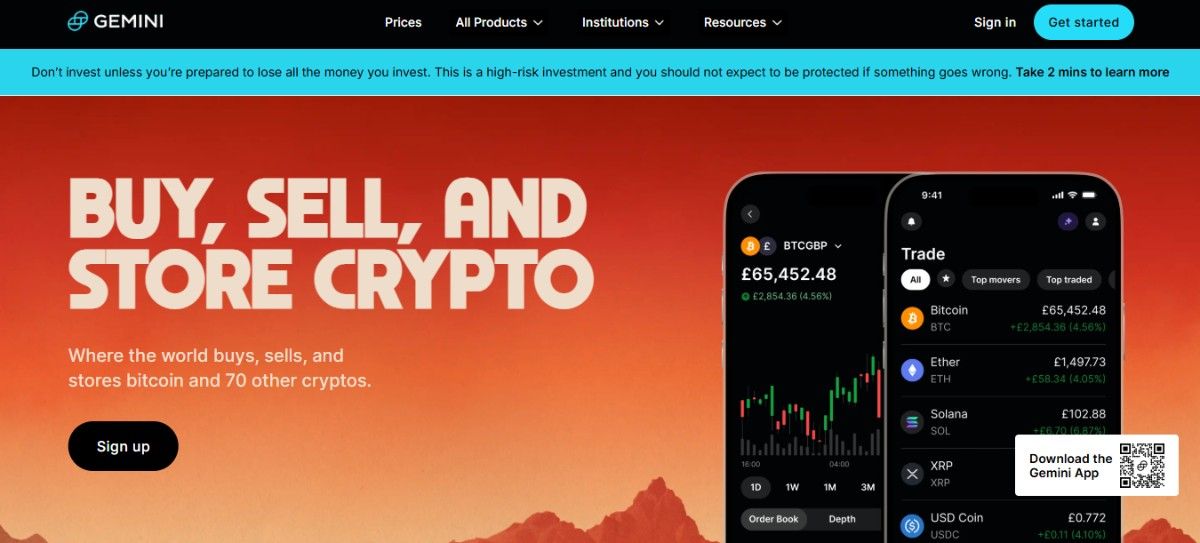Key takeaway: Capital One in the UK does not currently allow direct cryptocurrency purchases, transfers, or payments to crypto exchanges through its banking platform. The bank maintains strict anti-fraud and anti-money-laundering measures, which often result in declined card payments or blocked transfers to certain crypto platforms. However, users can still gain exposure to digital assets by using regulated, FCA-compliant exchanges like Bitpanda, one of Europe’s most trusted trading platforms. Bitpanda supports instant GBP deposits via alternative payment methods such as SEPA transfers, third-party wallets, or linked bank accounts, providing a simple, compliant way to trade popular assets like Bitcoin, Ethereum, and Solana.
In this article, we provide a complete, step-by-step guide on how to buy crypto with Capital One safely in the UK.
What is the Capital One Official Policy toward Crypto?
Capital One’s official policy is pretty straightforward, as the bank doesn’t allow credit card payments for crypto purchases. If you try to use your Capital One credit card to buy Bitcoin, Ethereum, or any other cryptocurrency through an exchange, the transaction will most likely be declined. This is because the bank classifies crypto transactions as high-risk due to concerns about fraud and volatility.
For debit cards and bank transfers, the policy isn’t as black and white. There’s no public statement saying Capital One completely bans them, but in reality, transactions linked to crypto platforms can still get blocked or flagged. That means your experience might vary; one exchange might process your deposit without issue, while another might reject it.
Does Capital One allow Direct Crypto Purchases in the UK?
Capital One doesn’t currently allow direct crypto purchases in the UK. You can’t buy Bitcoin, Ethereum, or any other digital asset straight from your Capital One account or by using your Capital One card on an exchange. The bank blocks credit card transactions related to crypto, and even debit card or transfer attempts can be hit or miss, depending on the platform. So, if you plan to use Capital One to buy crypto, you’ll need to take an indirect route. You can fund your account through an FCA-regulated exchange that accepts GBP transfers or use a third-party payment provider that’s compatible with Capital One accounts.
How to Buy Crypto with Capital One: 6 Simple Steps
- Choose a trusted crypto exchange
Start with a platform that works well with UK banks; Bitpanda is a good pick. Make sure the exchange is FCA-registered so your funds and data stay protected. - Create and verify your account
Sign up on your chosen exchange and complete the KYC (Know Your Customer) process. It usually takes just a few minutes to get verified. - Add your Capital One details
Head to the “Deposit” or “Payment Methods” section and link your Capital One debit card or bank account. If the exchange doesn’t accept Capital One directly, don’t worry, you can use an alternative, like a different linked bank account or a third-party payment app. - Deposit GBP into your exchange wallet
Transfer funds from Capital One to your exchange account. Double-check that the name on your bank and exchange account matches to prevent delays. - Choose the crypto you want to buy
Once you’ve made your deposit, browse the list of available assets: Bitcoin, Ethereum, Solana, or others, and choose your preferred option. Start small if it’s your first time; you can always buy more later. - Make your purchase and store it safely
Confirm your order, and you’ll see your crypto appear in your exchange wallet within seconds. To ensure safety, consider moving it to a personal wallet (like a hardware or mobile wallet).
Fees and Costs When Buying Crypto with Capital One
Bitpanda integrates its trading fees directly into the price displayed when you buy or sell cryptocurrency, a structure referred to as a premium. For most assets, this premium ranges from 0.00% to 2.49%, while Bitcoin has a fixed rate of 0.99%. Deposits and withdrawals of fiat currencies, including GBP, are free when made through any of Bitpanda’s supported payment methods. The platform also does not charge any custody or storage fees for holding your digital assets. When transferring cryptocurrency from Bitpanda to an external wallet, a blockchain network fee applies. While the built-in premium simplifies pricing and makes costs more transparent, users should note that a minor variation, known as the spread, may exist between Bitpanda’s displayed price and the live market rate.
On the standard Gemini app, instant buy and sell transactions have a total fee of about 1.49%. Users trading on the ActiveTrader platform benefit from lower, volume-based maker-taker fees, which range between 0.00% and 0.40%, depending on trading volume. Deposits made via bank transfer are free of charge, while debit card deposits incur a higher fee of around 3.49%. Withdrawals to UK or international bank accounts through standard transfer channels are fee-free, although wire transfers may attract a flat fee of about $25. When withdrawing cryptocurrency to an external wallet, network fees, paid to blockchain validators, apply and fluctuate based on network activity.
eToro applies a flat 1% commission on all cryptocurrency trades, charged both when you buy and when you sell. This fee is already included in the quoted market price, ensuring transparency at every transaction. There are no deposit fees for supported currencies. However, a $5 withdrawal fee is applied to each fiat withdrawal made from USD investment accounts to external bank accounts. For users transacting in GBP, a currency conversion fee of 1.5% to 3.0% applies when converting between GBP and USD, depending on the payment method used. Accounts that remain inactive for 12 consecutive months are subject to a $10 monthly inactivity fee. Also, transfers between your main eToro trading account and the eToro Money Wallet attract a 2% transfer fee.
Common Ways to Deposit from Capital One to Crypto Exchanges
ACH Transfers or Wire Transfers
Users can initiate a standard wire transfer to an exchange that provides a verified bank account and reference code (such as Bitpanda). Transfers take one to three business days to process. Although Capital One may review transactions linked to digital assets, wire transfers to regulated platforms are generally less likely to be declined. ACH transfers allow Capital One users to move funds directly from their accounts to an exchange that supports GBP deposits. This method is often free or low-cost and works best with exchanges under the supervision of the Financial Conduct Authority (FCA).
Capital One Debit Card
Some FCA-regulated crypto exchanges allow users to make instant deposits using their Capital One debit card. While convenient, these payments may not always be approved due to Capital One’s strict monitoring of transactions linked to crypto platforms. If a payment is declined, you can switch to a bank transfer or another supported method to complete the process.
Third-Party Payment Platforms
Capital One account holders can transfer funds to third-party payment providers that support crypto purchases or deposits. This indirect route can be useful when Capital One blocks direct payments to exchanges.
Peer-to-Peer (P2P) Transfers
When direct deposits are restricted, users can turn to peer-to-peer marketplaces. These platforms connect buyers and sellers directly, allowing users to send money from their Capital One account via regular bank transfer. Once the payment is verified, the crypto is released to the buyer’s exchange wallet.
What is Capital One?
Capital One is a major financial institution headquartered in McLean, Virginia, United States, best known as one of the largest credit card issuers in the world. Founded in 1994, the bank has grown into a Fortune 500 company with over 100 million customer accounts and a strong presence across consumer banking, credit cards, and auto loans. In the UK, Capital One operates primarily as Capital One (Europe) plc, authorised and regulated by the Financial Conduct Authority (FCA) and the Prudential Regulation Authority (PRA). The UK arm focuses mainly on credit card services rather than full-service retail banking, offering products created to help customers build or improve their credit. Capital One’s operations are largely digital-first, supported by a well-designed online banking platform and mobile app, though it does not maintain an extensive network of physical branches. With millions of users relying on its credit solutions and online services, the bank has earned a strong reputation for innovation and customer support.
What Crypto-Related Services does Capital One Support?
Capital One does not currently offer any dedicated cryptocurrency services within its banking products in the UK. There are no built-in wallet features, crypto trading options, or official partnerships with cryptocurrency platforms. However, customers can still use standard banking features, such as debit cards, bank transfers, and account funding, to facilitate transactions with external, FCA-regulated crypto exchanges that accept Capital One payments. Anyone looking to buy Bitcoin with Capital One or any other digital asset will need to do so through compliant third-party platforms, not through the bank itself.
Conclusion
This guide has walked through every practical way to buy crypto with Capital One in the UK, showing what works, what doesn’t, and how to stay on the right side of the bank’s policies. It’s clear that while Capital One maintains a cautious stance toward digital assets, it doesn’t completely shut out users who want to participate. The main thing to keep in mind is that crypto transactions still come with market risks, regulatory changes, and potential banking reviews, so it’s best to stick with FCA-registered exchanges and verified sellers.










 usdt
usdt bnb
bnb

